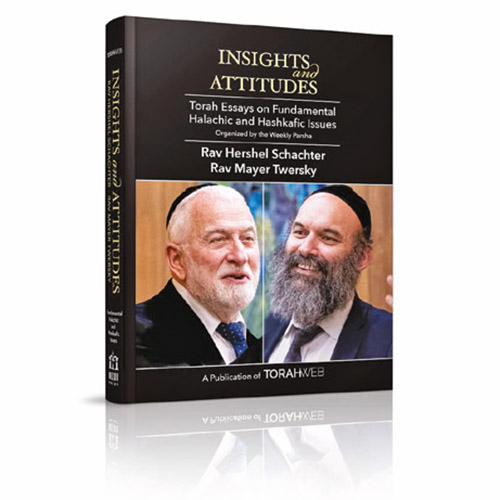
Editor’s note: This series is reprinted with permission from “Insights & Attitudes: Torah Essays on Fundamental Halachic and Hashkafic Issues,” a publication of TorahWeb.org. The book contains multiple articles, organized by parsha, by Rabbi Hershel Schachter and Rabbi Mayer Twersky.
Some sociologists opine that money is an evil of society. The Chazon Ish (Yoreh De’ah 72:2) pointed out that halacha does not share that perspective. Rather, even in an ideal Torah world, we would use kesef to fulfill mitzvos.
The halacha declares that in most instances shaveh kesef (a commodity which has value) can be used in place of kesef. For example, we get married by having the chasan hand a ring, i.e., shaveh kesef, to the kallah, as opposed to giving her kesef, and this constitutes a form of kiddushei kesef. Nonetheless, one can only fulfill the mitzva of machatzis hashekel by giving kesef to the Beis HaMikdash for the purpose of purchasing the korbanos tzibbur (Bechoros 51a).
A variety of opinions are presented in the Shulchan Aruch (Choshen Mishpat 369) regarding the extent to which halacha recognizes dina demalchusa. The Shach (Yoreh De’ah 165:8) points out that all agree that dina demalchusa determines what is considered kesef. Whatever currency the government of any given country establishes has the halachic status of kesef. When the second Beis HaMikdash was built, there was no Jewish government ruling over Eretz Yisrael. As such, the mitzva of machatzis hashekel had to be fulfilled by giving a coin recognized as kesef by the ruling non-Jewish government. After several centuries, when the Chashmonaim established a Jewish government in Eretz Yisrael and minted their own coins, “Jewish” coins replaced the “non-Jewish” coins for this mitzva.
The Talmud (Pesachim 54b) speaks of the concept of money being part of God’s initial plan for creating the world, just as the Torah and the mitzvos preceded the creation of the world. The Rabbis of the Talmud (Shabbos 33b) tell us that Yaakov Avinu improved the life of the citizens of Shechem by introducing a monetary system for them. Money is something positive. Without money we cannot function.
Judaism, as opposed to certain other religions, has never preached that poverty is an ideal. The Rema (Shulchan Aruch, Orach Chaim 248) considers making a living something positive, comparable to a mitzva. As such, one who lives in Eretz Yisrael is permitted to go to chutz laAretz for the purpose of making a living. Even if one is making ends meet, but wants to go to chutz laAretz to make a more comfortable living, the accepted opinion is that this too is permissible. However, we would not allow one who already makes a comfortable living to go to chutz laAretz in order to become wealthy (see Moed Katan 14a). There is no mitzva to be poor, but there is also no mitzva to be rich.
We all need food in order to survive, be healthy and function. However, we should not love food. Many Americans suffer from obesity because they love food and overeat. Similarly, we all need money to live in this world. However, we should not develop a love for money. Koheles (5:9) teaches us that one who loves money will never be satisfied with the money he has. The Midrash (Koheles Rabba 1:34) famously comments:
אין אדם יוצא מן העולם וחצי תאותו בידו, “When those who love money die, regardless of how much money they have amassed, it will not be even half of what they desired.”
The Talmud (Avoda Zara 11a) tells us that R. Yehuda HaNasi was extremely wealthy, which was necessary for his position as chief rabbi. But he did not love the money. In fact, he hardly took any pleasure from this world (Kesubos 104a).
The parsha tells us (Bereishis 47:14) that Yosef amassed all of the cash from Egypt and Canaan by selling the grain that he stored. He understood that this was needed for the Egyptian government, and apparently saw this as part of the message of Pharaoh’s dream. However, we do not get the impression that he became one who loved money.
The Midrash (Koheles Rabba 5:8) distinguishes between two types of observant Jews: one who merely observes the mitzvos, and one who loves mitzvos. The one who observes but does not love mitzvos will be satisfied with keeping the mitzvos which come his way. But the one who loves mitzvos will always be on the lookout for additional mitzvos. He will never be satisfied with the mitzvos that he may have fulfilled already: “אוהב מצוות לא ישבע מצוות.”
Rather than love money, or love food, we should all develop a love for mitzvos.
Rabbi Hershel Schachter joined the faculty of Yeshiva University’s Rabbi Isaac Elchanan Theological Seminary in 1967, at the age of 26, the youngest Rosh Yeshiva at RIETS. Since 1971, Rabbi Schachter has been Rosh Kollel in RIETS’ Marcos and Adina Katz Kollel (Institute for Advanced Research in Rabbinics) and also holds the institution’s Nathan and Vivian Fink Distinguished Professorial Chair in Talmud. In addition to his teaching duties, Rabbi Schachter lectures, writes, and serves as a world renowned decisor of Jewish Law.









